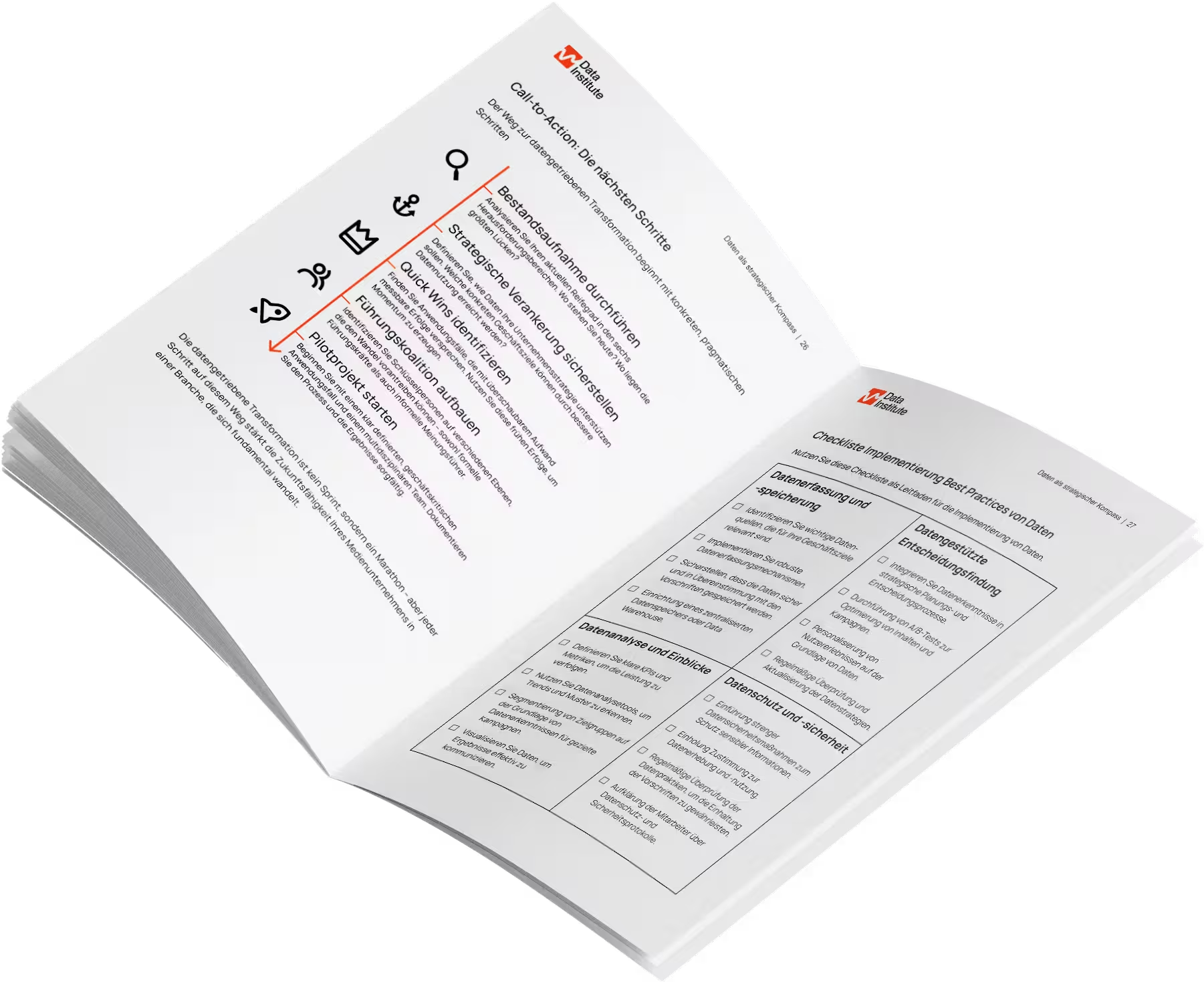GenBI: Guide to AI-driven data analysis


The roadmap for data-driven transformation
The ePaper shows you strategies, success stories and a checklist for a direct start into the digital future.

- Das ist eine H2
- Das ist eine H3
Welcome to your guide to the future of data analysis! In a world that is increasingly driven by data, it is crucial not only to collect information but also to transform it into actionable insights. This guide highlights Generative Business Intelligence (GenBI) — a revolutionary development that helps companies unlock their full data potential.
What is Generative Business Intelligence (GenBI)?
Imagine that your data could not only tell you what happened in the past, but also what will happen next and the opportunities that arise as a result. That is exactly what does Generative Business Intelligence (GenBI).
GenBi revolutionizes the way companies use data by Business Intelligence (BI) with Artificial intelligence (AI) combined. In contrast to traditional BI tools, which often focus on analyzing large amounts of data and creating static reports, GenBI goes a decisive step further: It is a innovative platform that uses AI to generate new insights and predictions from existing data. It provides dynamic and interactive insights into your data.
The key benefits of GenBi are diverse and geared directly to business success:
- Faster results: GenBi automates many manual processes and thus delivers meaningful results in a very short time.
- Higher accuracy: Through the use of Machine learning algorithms GenBi enables more accurate forecasts and more informed decisions.
- Scalability: The platform is flexible and can be adapted to growing amounts of data and complex requirements without sacrificing performance.
- Innovation: GenBi uncovers hidden patterns and trends in your data and thus opens up new opportunities for innovation.
- Transformation: It transforms data collections into a strategic compass for profitable decisions.
- Improved customer experiences: GenBi enables the creation of tailored customer experiences, which significantly strengthens customer satisfaction and loyalty.
Why is GenBi relevant for companies?
The relevance of GenBi for modern companies can hardly be overestimated. It is called the The future of data analysis considered. In today's highly competitive business world, raw data alone is no longer enough; it is the actionable insights that create real market advantages. Companies that make extensive use of customer analytics — an area where GenBI excels — achieve, according to McKinsey 126% more profit than their competitors.
GenBi helps companies to fully exploit their data potential and turn their data collection into a strategic compass for profitable decisions. It enables business data to be transformed into actionable information, which in turn supports strategic decisions and can drive business growth. Especially in the age of AI, the use of GenBi is significantly increasing. Without using GenBi, this enormous potential often remains untapped.
GenBi in practice: use cases in various industries
GenBi is already widely used in various sectors and is delivering impressive results:
GenBi in retail
- Inventory optimization: A large retailer uses GenBi to analyze sales data in real time. The result was a Reducing excess inventory and improved supply chain efficiency.
- Customer segmentation: An online shop uses GenBi for detailed customer segmentations. By analyzing buying behavior and demographic data, the company was able to develop targeted marketing campaigns, resulting in a Sales increase led.
GenBi in the financial sector
- Risk management: A bank implements GenBi to analyze credit risks. Data-based forecasts made it possible to better estimate potential payment defaults, resulting in a Reducing credit defaults led.
- Customer loyalty through personalized offers: A financial service provider uses GenBi to offer personalized financial products based on clients' individual needs. This led to a Increasing customer satisfaction and increasing the number of contracts concluded.
The technological pillars of GenBi
GenBI is based on an intelligent combination of business intelligence with cutting-edge AI technologies. Here are the key technological pillars that drive GenBi:
- Artificial intelligence (AI): AI systems can analyze huge amounts of data and gain valuable insights that human analysts would miss out on. GenBi uses AI to get from existing data to generate new insights and forecasts. AI systems can even understand natural language and answer complex questions.
- Machine Learning (ML): As an indispensable pillar of AI, ML enables computer models to learn from data and make predictions or make decisions based on this information without being explicitly programmed to do so. GenBi uses ML algorithms to more accurate forecasts to enable.
- Large Language Models (LLMs): These models are pre-trained with huge amounts of text and have a wide range of world knowledge and language comprehension. They are able to combine information and draw logical conclusions (reasoning). This enables GenBi to generate tailored queries and uncover hidden patterns.
- Retrieval-Augmented Generation (RAG): Many modern AI systems use RAG to integrate current knowledge and verify facts. The AI model draws on search indices and sources in real time and cites excerpts from websites to substantiate its answers (grounding). For your website, this means that your content must be able to be found and read by AI crawlers to serve as the basis for an AI answer.
- Modern data architectures: GenBI solutions are often based on robust and scalable data infrastructures such as a modern data stack. These include data warehouses or data lakes for storing and processing large amounts of data. Technologies such as Google Cloud's BigQuery enable GenAI-based semantic search and data insights.
Implementing GenBi: Steps and Challenges
The successful implementation of GenBi is a strategic journey that goes beyond mere technology introduction and requires a holistic approach.
Typical implementation processes
Professional BI consulting is a valuable partner here. The Data Institute's proven process for implementing BI and GenBI solutions typically comprises five stages:
1. Data Audit: The starting point is a comprehensive inventory of your current data landscape, capabilities, and maturity level. This involves identifying weaknesses in processes, responsibilities and data quality. Quick-win potential is also being uncovered.
2. BI strategy development: Based on the audit, a tailored roadmap is created that links your business goals with data capabilities. This includes prioritizing use cases and technology recommendations.
3. Data architecture: The solid technical foundation is created here. This includes the integration and consolidation of data sources, the design of Data warehouse/Lake architectures that Implementation of ETL/ELT processes and data quality management systems. Modern cloud technologies can play a decisive role in this.
4. BI solution implementation: In this phase, the tools and systems are brought to life. This includes developing dashboards and reports, implementing self-service analytics features, and developing predictive models.
5. Change Management: Transforming corporate culture is crucial for a lasting effect. This includes empowering users Data literacy training programs and building an Analytics Center of Excellence.
Potential hurdles and how to overcome them
Implementing GenBi also presents challenges that must be addressed:
- Data complexity: Companies are confronted with exponentially growing volumes, diversity and speed of data.
- Integration challenges: It is often difficult to connect different data sources and systems. A Data Catalog can remedy this by presenting a central directory of all company data and improving its findability, accessibility and administration.
- Skills gap: There is a significant shortage of specialized AI and BI talent on the job market. Targeted data science workshops and training courses can empower employees and strengthen the data culture.
- Data quality: The well-known formula “garbage in, garbage out” is gaining new urgency in the age of AI. Inaccurate or incomplete data leads to unreliable results. One robust data governance This is the basis for ensuring data quality, security and compliance.
- Cultural resistance: The transition to data-driven decisions requires a fundamental change in corporate culture, particularly in areas traditionally characterized by intuition. Transparency about data sources, the demonstration of quick wins and support from managers are crucial to creating acceptance and overcoming resistance.
The Data Institute: Your partner for GenBI success
The Data Institute is your expert for implementing GenBI solutions and helps companies make full use of their data potential. We are no ordinary consultancy; we rely on practical tips and recommendations for action, which are individually tailored to your needs.
Our expertise lies in combining technology and humanity, who design of processes and corporate cultures as well as the application of a data and customer-oriented approach. Our focus is on making you and your teams empower you to use data independently and make data-driven decisions.
We work with a proven triad of culture, organization and architecture:
- Culture: We help you establish a data-based way of thinking and appropriate working methods. Management and openness to innovation play a decisive role here.
- Organization: We define clear roles, responsibilities and decision-making processes. This can involve implementing models such as Hub-and-spoke system to enable the coordination and efficient implementation of reporting requirements.
- Architecture: We create a robust technical basis with a Modern Data Stack, which is scalable, future-proof, and compliance-oriented. Our advice is tool-agnostic so that we always find the best solution for your goals.
Our track record speaks for itself: For example, at MediaPrint, Austria's largest newspaper publisher, we were able to create a 34% increase in digital advertising revenue through advanced target group analyses and a 94% Data Champion adoption Rate achieve.
We offer a free BI strategy consultation to analyze your current situation without obligation, assess your BI potential and identify concrete quick wins for the first 90 days.
Looking ahead: The future of GenBi
The development of GenBi is progressing rapidly. In the future, we can still smarter and more powerful solutions who, for example, understand natural language even more comprehensively and can answer more complex questions.
GenBI will play a crucial role in helping companies manage digital transformation and new business opportunities to develop. AI integrations will increasingly find their way into various applications, from voice assistants to car navigation to smart home devices and business software.
The media industry is an excellent example of how the future will be shaped by data: personalization will become the standard, AI will help create content, and new data-driven business models will emerge. Real-time data analysis will play an essential role in making quick and well-founded decisions based on current trends and user behavior.
Contact us for a non-binding initial consultation and find out how we can help your company successfully implement GenBI and utilize your full data potential.
Arrange a free initial consultation
Picture: Google Deepmind on Unsplash

Don't miss an update on GenBi.
Simply subscribe to our newsletter.
Don't miss an update on GenBi.
Simply subscribe to our newsletter.

Don't miss an update on GenBi.
Simply subscribe to our newsletter.

Related case studies
There are suitable case studies on this topic
Which services fit this topic?







